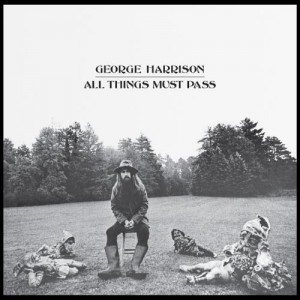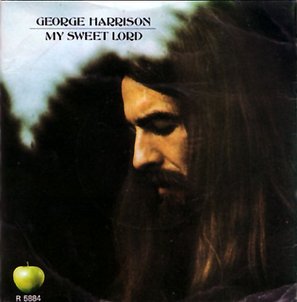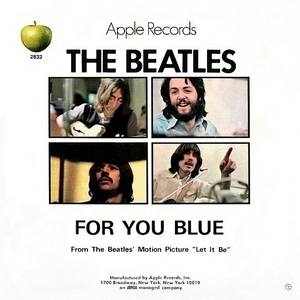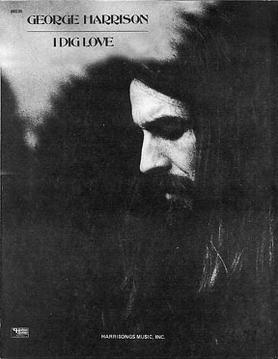
All Things Must Pass is the third studio album by the English rock musician George Harrison. Released as a triple album in November 1970, it was Harrison's first solo work after the break-up of the Beatles in April that year. It includes the hit singles "My Sweet Lord" and "What Is Life", as well as songs such as "Isn't It a Pity" and the title track that had been overlooked for inclusion on releases by the Beatles. The album reflects the influence of Harrison's musical activities with artists such as Bob Dylan, the Band, Delaney & Bonnie and Friends and Billy Preston during 1968–70, and his growth as an artist beyond his supporting role to former bandmates John Lennon and Paul McCartney. All Things Must Pass introduced Harrison's signature slide guitar sound and the spiritual themes present throughout his subsequent solo work. The original vinyl release consisted of two LPs of songs and a third disc of informal jams titled Apple Jam. Several commentators interpret Barry Feinstein's album cover photo, showing Harrison surrounded by four garden gnomes, as a statement on his independence from the Beatles.

"My Sweet Lord" is a song by English musician George Harrison, released in November 1970 on his triple album All Things Must Pass. It was also released as a single, Harrison's first as a solo artist, and topped charts worldwide; it was the biggest-selling single of 1971 in the UK. In America and Britain, the song was the first number-one single by an ex-Beatle. Harrison originally gave the song to his fellow Apple Records artist Billy Preston to record; this version, which Harrison co-produced, appeared on Preston's Encouraging Words album in September 1970.

"For You Blue" is a song by the English rock band the Beatles from their 1970 album Let It Be. The track was written by George Harrison as a love song to his wife, Pattie Boyd. It was also the B-side to the "Long and Winding Road" single, issued in many countries, but not Britain, and was listed with that song when the single topped the US Billboard Hot 100 and Canada's national chart in June 1970. On the Cash Box Top 100 chart, which measured the US performance of single sides individually, "For You Blue" peaked at number 71.

"Old Brown Shoe" is a song by the English rock band the Beatles. Written by George Harrison, the group's lead guitarist, it was released on a non-album single in May 1969, as the B-side to "The Ballad of John and Yoko". The song was subsequently included on the band's compilation albums Hey Jude, 1967–1970 and Past Masters, Volume Two. Although "Old Brown Shoe" remains a relatively obscure song in the band's catalogue, several music critics view it as one of Harrison's best compositions from the Beatles era and especially admire his guitar solo on the track.

"All Things Must Pass" is a song by English rock musician George Harrison, issued in November 1970 as the title track to his triple album of the same name. Billy Preston released the song originally – as "All Things (Must) Pass" – on his Apple Records album Encouraging Words (1970) after the Beatles had rehearsed the song in January 1969 but did not include it on their Let It Be album. The composition reflects the influence of the Band's sound and communal music-making on Harrison, after he had spent time with the group in Woodstock, New York, in late 1968. In his lyrics, Harrison drew inspiration from Timothy Leary's poem "All Things Pass", a psychedelic adaptation of the Tao Te Ching.
"Beware of Darkness" is a song by English rock musician George Harrison from his 1970 triple album All Things Must Pass. It is the opening track on the second disc of the album. The lyrics warn against allowing illusion to get in the way of one's true purpose in life, an admonition that, like the content of "My Sweet Lord", reflects the influence of Harrison's association with the Radha Krishna Temple. Several critics recognise the song as one of the best tracks on All Things Must Pass.
"Don't Let Me Wait Too Long" is a song by English rock musician George Harrison, released on his 1973 album Living in the Material World. It was scheduled to be issued as a single in September that year, as the follow-up to "Give Me Love ", but the release was cancelled. Music critics have traditionally viewed "Don't Let Me Wait Too Long" as a highlight of the Material World album, praising its pop qualities and production, with some considering the song worthy of hit status.

"Wah-Wah" is a song by English rock musician George Harrison from his 1970 triple album All Things Must Pass. Harrison wrote the song following his temporary departure from the Beatles in January 1969, during the troubled Get Back sessions that resulted in their Let It Be album and film. The lyrics reflect his frustration with the atmosphere in the group at that time – namely, Paul McCartney's over-assertiveness and criticism of his guitar playing, John Lennon's lack of engagement with the project and dismissal of Harrison as a songwriter, and Yoko Ono's constant involvement in the band's activities. Music critics and biographers recognise the song as Harrison's statement of personal and artistic freedom from the Beatles. Its creation contrasted sharply with his rewarding collaborations outside the group in the months before the Get Back project, particularly with Bob Dylan and the Band in upstate New York.
"I Live for You" is a song by English rock musician George Harrison originally recorded during the sessions for his All Things Must Pass triple album in 1970. Long available on bootlegs, the song was finally released officially as a bonus track on the 30th anniversary reissue of All Things Must Pass in January 2001. The released recording features only Harrison's lead vocal and Pete Drake's prominent pedal-steel guitar from the 1970 album sessions, with all other instruments overdubbed by Harrison and his son Dhani in 2000. Despite the wealth of unreleased material recorded for All Things Must Pass, it was the only new song included with the album's 2001 reissue. Music critics recognise "I Live for You" as one of many George Harrison compositions that can be interpreted as both a traditional love song and a devotional song.
"I'd Have You Anytime" is a song written by George Harrison and Bob Dylan, released in 1970 as the opening track of Harrison's first post-Beatles solo album, All Things Must Pass. The pair wrote the song at Dylan's home in Bearsville, near Woodstock in upstate New York, in November 1968. Its creation occurred during a period when Harrison had outgrown his role in the Beatles and Dylan had withdrawn from the pressures of fame to raise a family. "I'd Have You Anytime" is recognised as a statement of friendship between the two musicians, whose meetings from 1964 onwards resulted in changes in musical direction for both Dylan and the Beatles. The song reflects the environment in which it was written, as Harrison's verses urge the shy and elusive Dylan to let down his guard, and the Dylan-composed choruses respond with a message of welcome.

"Run of the Mill" is a song by English musician George Harrison, released on his 1970 triple album All Things Must Pass. Harrison wrote the song shortly after the Beatles' troubled Get Back sessions in early 1969, during a period when his growth as a songwriter had inadvertently contributed to the dysfunction within the Beatles' group dynamic. It is commonly asserted that the lyrics reflect the toll that running their company Apple Corps had taken on relationships within the band, especially between Paul McCartney and the other three Beatles, as well as Harrison's dismay at John Lennon's emotional withdrawal from the band. Many commentators recognise "Run of the Mill" as one of several Harrison compositions that provide an insight into events behind the Beatles' break-up, particularly the difficulties surrounding Apple.
"Awaiting on You All" is a song by English musician George Harrison, released on his 1970 triple album, All Things Must Pass. Along with the single "My Sweet Lord", it is among the more overtly religious compositions on All Things Must Pass, and the recording typifies co-producer Phil Spector's influence on the album, due to his liberal use of reverberation and other Wall of Sound production techniques. Harrison recorded the track in London backed by musicians such as Eric Clapton, Bobby Whitlock, Klaus Voormann, Jim Gordon and Jim Price – many of whom he had toured with, as Delaney & Bonnie and Friends, in December 1969, while still officially a member of the Beatles. Musically, the composition reflects Harrison's embracing of the gospel music genre, following his production of fellow Apple Records artists Billy Preston and Doris Troy.

"Let It Down" is a song by English musician George Harrison, released on his 1970 triple album All Things Must Pass. The recording was co-produced by Phil Spector and employs the latter's Wall of Sound production technique to lavish effect. Its brash opening and choruses contrast with the ethereal quality of the verses – a loud/soft approach that has been credited with influencing indie bands during the 1980s and 1990s.

"I Dig Love" is a song by English rock musician George Harrison from his 1970 triple album All Things Must Pass. A paean to free love, it marks a departure from the more profound, spiritually oriented subject matter of much of that album. Musically, the song reflects Harrison's early experimentation with slide guitar, a technique that he was introduced to while touring with Delaney & Bonnie and Friends in December 1969.

"Art of Dying" is a song by English rock musician George Harrison from his 1970 triple album All Things Must Pass. Harrison began writing the song in 1966 while still a member of the Beatles and during a period when he had first become enamoured with Hindu-aligned spirituality and other aspects of Indian culture. The subject matter is reincarnation and the need to avoid rebirth, by limiting actions and thoughts that lead to one's soul returning in another, earthbound life form.
"Hear Me Lord" is a song by English rock musician George Harrison from his 1970 triple album All Things Must Pass. It was the last track on side four of the original LP format and is generally viewed as the closing song on the album, disc three being the largely instrumental Apple Jam. Harrison wrote "Hear Me Lord" in January 1969 while still a member of the Beatles, who rehearsed it briefly at Twickenham Film Studios that month, but passed it over for inclusion on what became their final album, Let It Be.

"Deep Blue" is a song by English rock musician George Harrison that was released as the B-side to his 1971 charity single "Bangla Desh". Harrison wrote the song in 1970, midway through the recording sessions for All Things Must Pass, and recorded it in Los Angeles the following year while organising the Concert for Bangladesh. The composition was inspired by the deteriorating condition of his mother, Louise, before she succumbed to cancer in July 1970, and by Harrison's feelings of helplessness as he visited her in hospital in the north of England. Given the subject matter, "Deep Blue" also served to convey the suffering endured by the millions of refugees from war-torn Bangladesh in 1971, as sickness and disease became widespread among their makeshift camps in northern India.

"Māya Love" is a song by English musician George Harrison, released on his 1974 album Dark Horse. The song originated as a slide guitar tune, to which Harrison later added lyrics relating to the illusory nature of love – maya being a Sanskrit term for "illusion", or "that which is not". Harrison's biographers consider the lyrical theme to be reflective of his failed marriage to Pattie Boyd, who left him for his friend Eric Clapton shortly before the words were written. Harrison recorded the song at his home, Friar Park, on the eve of his North American tour with Ravi Shankar, which took place in November and December 1974. The recording features Harrison's slide guitar extensively and contributions from four musicians who formed the nucleus of his tour band: Billy Preston, Tom Scott, Willie Weeks and Andy Newmark. Reviewers note the track as an example of its parent album's more diverse musical genres, namely funk and rhythm and blues, compared with the more traditional rock orientation of Harrison's earlier solo work.
"Beautiful Girl" is a song by English musician George Harrison, released on his 1976 album Thirty Three & 1/3. Harrison began writing the song in 1969 and considered recording it for his 1970 triple album All Things Must Pass. In its finished, 1976 form, the lyrics of "Beautiful Girl" were inspired by Harrison's second wife, Olivia Arias.

"Apple Scruffs" is a song by English rock musician George Harrison from his 1970 triple album All Things Must Pass. He wrote it as a tribute to the die-hard Beatles fans known as Apple scruffs, who used to wait outside the Apple Corps building and other London locations for a glimpse of the band members. This tradition continued after the group's break-up in April 1970, as the scruffs were a regular presence outside the studios where Harrison recorded his album. The song was also issued on the album's second single, as the B-side to "What Is Life".











